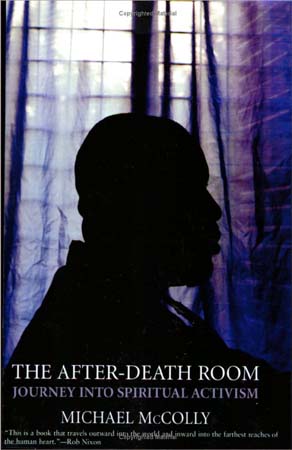
McColly, who's not complaining, never chose an easy career path. A native of Marion, Ind., McColly moved to Chicago in 1980 to pursue an acting career, followed by stints in the Peace Corps, the University of Chicago Divinity School and the University of Washington, where he earned a degree in creative writing. In 1996 he was diagnosed as HIV-positive, which inspired him to become more closely involved in studying the AIDS crisis. Much of The After-Death Room paints an alarming portrait of the epidemic: The president of South Africa standing at a 2000 conference denying that HIV causes AIDS; doctors in India who refuse to treat AIDS patients; the difficulty of getting medicine in Vietnam (in 2001 he was told that exactly seven people in the country had access to HIV combination-drug therapy).
Chicago, the subject of one chapter in the book, has its own concerns. McColly interviews local activists, social workers, and doctors at Cook County Jail, which takes in an estimated 4,000 HIV- positive people every year. Public-health programs are overwhelmed and better health care for criminals tops no politician's legislative agenda, but McColly argues that such willful ignorance only perpetuates the problem. "We can't give them anything but the very basic health care," he says. "But the fact is, these people go back into their communities. They go back and they have sex . . . I know that you don't want to give them much health care, but these people affect others." Fixing the problem, McColly says, requires a host of changes: stronger international public-health initiatives, more financial cooperation from pharmaceutical companies, and more work to remove the stigma of HIV from communities. And in The After-Death Room, he also writes at length about the small but substantial role that his yoga training has played in his own treatment, and some of the most intriguing passages in the book follow him passing that knowledge on to others.
In The After-Death Room: Journey Into Spiritual Activism, Senegal RPCV Michael McColly catalogs his trips through Asia, Africa, and the United States as he attempts to get a grip on the global AIDS crisis
Literary activism: HIV-positive author trying to become part of solution
Feb 11, 2007
Chicago Sun-Times
There are a lot of emotional and intellectual benefits to working as a journalist and activist: See the world, bring the news, have a hand in improving people's lives.
But as Michael McColly well knows, more tangible perks are harder to come by. In The After-Death Room: Journey Into Spiritual Activism, he catalogs his trips through Asia, Africa, and the United States as he attempts to get a grip on the global AIDS crisis. It's a powerful, panoramic glimpse into the religious aspects of AIDS activism, the reality of the problem among poor sex workers, and the various bureaucratic bottlenecks that hamper better treatment. But struggling to get it published did McColly's bank book no favors.
McColly, an adjunct writing professor at Northwestern and Columbia College, took two unpaid leaves of absence in 2002 and 2004 to travel, research and write. "I'm not doing that well financially, frankly, because of the choice I made to do this book," he says. "It takes a lot of time to research. I took a second leave in 2004 because I realized that the book wasn't getting done fast enough. I sacrificed some financial security to get this done."
McColly, who's not complaining, never chose an easy career path. A native of Marion, Ind., McColly moved to Chicago in 1980 to pursue an acting career, followed by stints in the Peace Corps, the University of Chicago Divinity School and the University of Washington, where he earned a degree in creative writing.
In 1996 he was diagnosed as HIV-positive, which inspired him to become more closely involved in studying the AIDS crisis. Much of The After-Death Room paints an alarming portrait of the epidemic: The president of South Africa standing at a 2000 conference denying that HIV causes AIDS; doctors in India who refuse to treat AIDS patients; the difficulty of getting medicine in Vietnam (in 2001 he was told that exactly seven people in the country had access to HIV combination-drug therapy).
"Things have obviously changed [in Vietnam]," McColly says. "But still, it was illustrative of just how difficult it was to get the drugs out there. In South Africa, you have 400,000 to 500,000 people who need the drugs and they're not getting them. And there are more every month."
Chicago, the subject of one chapter in the book, has its own concerns. McColly interviews local activists, social workers, and doctors at Cook County Jail, which takes in an estimated 4,000 HIV- positive people every year. Public-health programs are overwhelmed and better health care for criminals tops no politician's legislative agenda, but McColly argues that such willful ignorance only perpetuates the problem.
"We can't give them anything but the very basic health care," he says. "But the fact is, these people go back into their communities. They go back and they have sex . . . I know that you don't want to give them much health care, but these people affect others."
Fixing the problem, McColly says, requires a host of changes: stronger international public-health initiatives, more financial cooperation from pharmaceutical companies, and more work to remove the stigma of HIV from communities. And in The After-Death Room, he also writes at length about the small but substantial role that his yoga training has played in his own treatment, and some of the most intriguing passages in the book follow him passing that knowledge on to others.
"I'm sure some people look at it like [rolling his eyes], 'Oh, a yoga teacher,' " he says. "I struggled with what to put in the book, because I know what people would think. . . . We've made it very esoteric here, but it's a very common idea: If you're more conscious of your health, your diet, your exercise, you're gonna be healthier."
The After-Death Room came out last September on the New York indie Soft Skull Press, which has a reputation for publishing strongly political and provocative books. Though McColly and his agent shopped the manuscript widely, mainstream publishers resisted the book. "I figured it had some cachet because I'd been to all of these places and I'm HIV-positive, but they didn't want to touch it," he says. "Some people would say, 'There are too many audiences for your book.' What? My life isn't perfectly one-dimensional. I'm bisexual, I'm a yoga teacher, I'm interested in international politics."
For now, McColly is concentrating on teaching writing, free- lancing (he's contributed to the New York Times, Salon, and other publications) and speaking around the country about the book. But eventually he'd like to return to some of the places he visited to write The After-Death Room, particularly to study the ways that popular culture and indigenous art forms are being used to promote AIDS education in Asia and Africa. "I think that was one of the things that saddened me about publishing the book was that I just touched on things," he says. "I saw international stories everywhere, and we don't do a very good job of paying attention to them."
Mark Athitakis, a former editor at the Chicago Reader, is a free- lance writer in Washington, D.C.
















